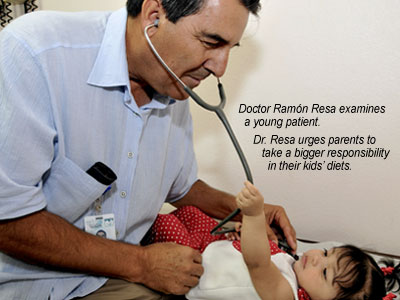
Kathleen Sebelius, the new Health and Human Services Secretary, made headlines the other day at a "Weight of the Nation" conference when she said that about 33 percent of American kids today are overweight or obese.
But in my Central California pediatric practice, the figure is much higher. I see about 40% Latino and 35% Anglo patients as well as many Hmong/Cambodian, Laotian, Filipino, East Indian, and Native American children. Child obesity is rampant
among every one of these groups, and I worry about the future health calamities these kids are going to be facing if nothing changes. Their physical, mental, and emotional health is at stake.This isn't just a personal issue that fuels unhappiness, depression, even teen suicides. It's also a serious economic issue, as this week's government statistics on the medical costs of treating obesity point out.
Here's what I see day after day in my practice. A mom brings in her 5-year-old son. He weighs 90 pounds, which would be healthy if he were twice that age and almost a foot taller. When I ask about any family history of metabolic disorders, she says, "I think so. A lot of my side of the family are overweight, even though we're not big eaters....I think he has another condition going on that's causing this. Can you test him?"
Then she takes another sip from her super-sized plastic cup of soda. The little boy has one too. But when I ask if he eats much junk food, she says no.
Secretary Sebelius was also quoted as saying that First Lady Michelle Obama is planning to take on child health as an issue. I'd like to sit down with her to discuss the following "talking points" (as the politicians say) regarding some of the basic causes and some workable for this national crisis.
Parents, take responsibility. When obese kids show up in my office, they're often there with a parent who is also obese. These parents don't say no to their kids' demands for junk food and they certainly aren't setting a good example with their own junk-food consumption. These kinds of parents also let their kids choose where and when to eat. They don't seem to care about the calories as long as the kids are happy and don't demand much attention.
Stop denying the obvious. The major factor in child obesity is totally obvious: kids today are fat because they eat too much (and move too little). But I see parents every week who insist that I test their kids for possible medical issues that are causing the problem. These parents also deny that they buy much junk food or go out for fast food more than "occasionally," but when I go shopping at the grocery store and run into them, their carts are piled high with junk food.
Are our own fears fueling our children's obesity? We've turned into a frightened society. We don't let our kids outside for fear that a deranged stranger may take them away. We fear that our next-door neighbors may harm our children, but we've never made any effort to get to know them ourselves. Instead of allowing our children to explore and sample life in the "outside world," we keep them inside, feed them junk food, and use TV as a babysitter.
Here are three simple solutions that we as parents can try -- if we're willing to do a better job of stepping up to our responsibilities.
1. Let's take back our neighborhoods and allow our kids to walk around picking up other kids as they go. I firmly believe that kids can and will protect each other just as well as adults can. It's when they're isolated and alone that they're vulnerable.
2. Support your family's physical health and your social ties with your neighborhood by going out on family walks. When it comes to sheer physical exercise, kids respond better when they're given a good example that they can model. "Do as I say" while you sit in front of the TV isn't going to work.
3. Turn off the TV (and ignore the kids' protests). Also, try to make TV a shared, whole-family event instead of a taken-for-granted routine where each member of the family is isolated in a one-on-one relationship with their own TV set night after night. Limit TV viewing to a few favorite shows each week. And go out for walks.
At age 3, Ramon Resa was put to work picking cotton and oranges in the fields of Central California. Today, he is a successful pediatrician, speaker and author. To learn more about Dr. Resa visit www.ramonresamd.com

